IT Project Management: Methodologies and Significance Analysis
VerifiedAdded on 2023/06/10
|7
|1201
|125
Report
AI Summary
This report examines the role of methodologies in IT project management, focusing on the Waterfall and Agile models. It defines methodology and its significance, detailing how these methodologies relate to the project life cycle. The Waterfall model, a linear sequential approach, is contrasted with the Agile model, which emphasizes iterative development and flexibility. The report highlights that both methodologies aim to deliver quality products efficiently, though they differ in their approach to flexibility and error management. The analysis underscores the importance of selecting the appropriate methodology to align with project objectives, manage risks, and ensure successful project outcomes. Desklib provides a platform for students to access this and other solved assignments to aid in their studies.
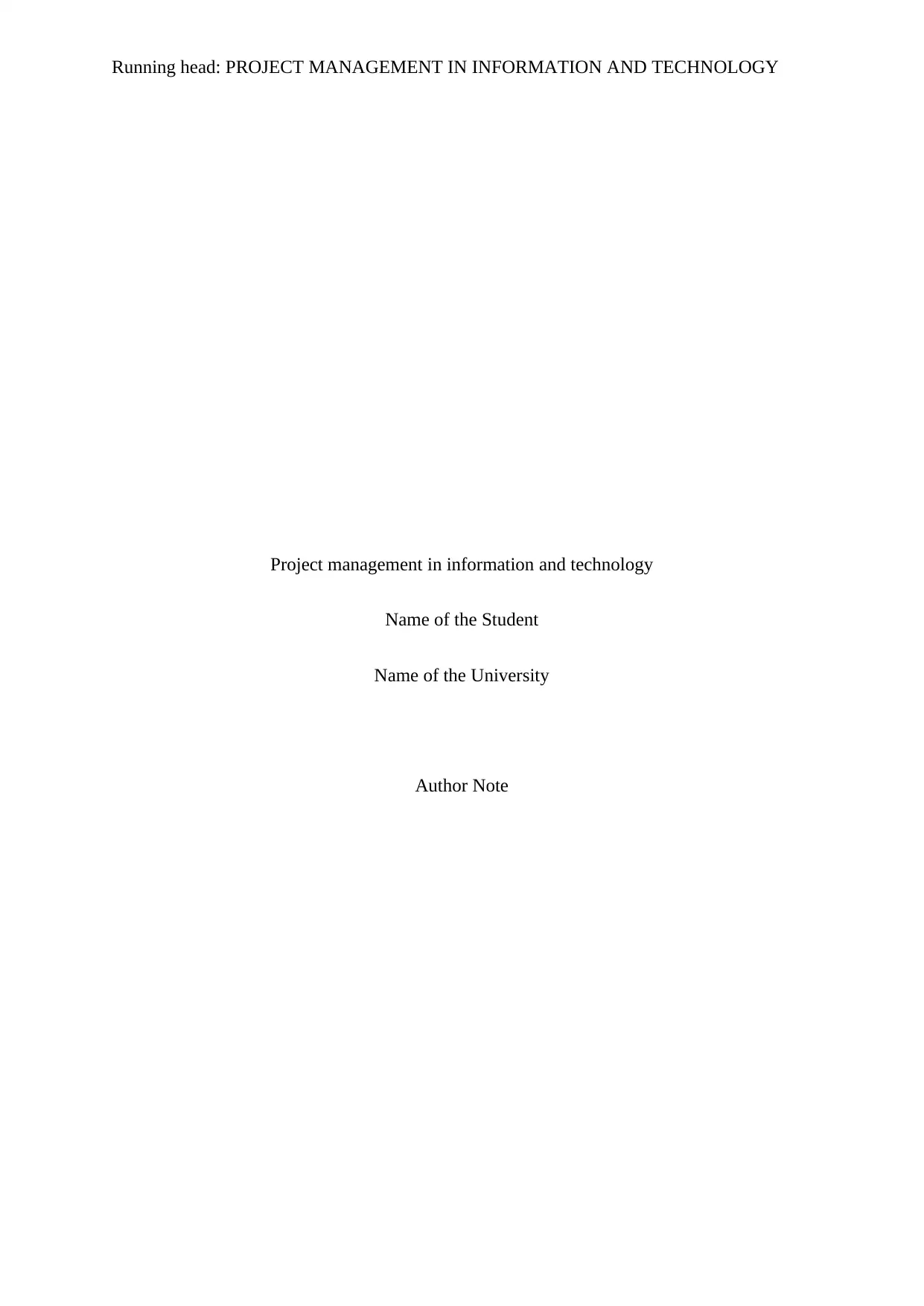
Running head: PROJECT MANAGEMENT IN INFORMATION AND TECHNOLOGY
Project management in information and technology
Name of the Student
Name of the University
Author Note
Project management in information and technology
Name of the Student
Name of the University
Author Note
Paraphrase This Document
Need a fresh take? Get an instant paraphrase of this document with our AI Paraphraser
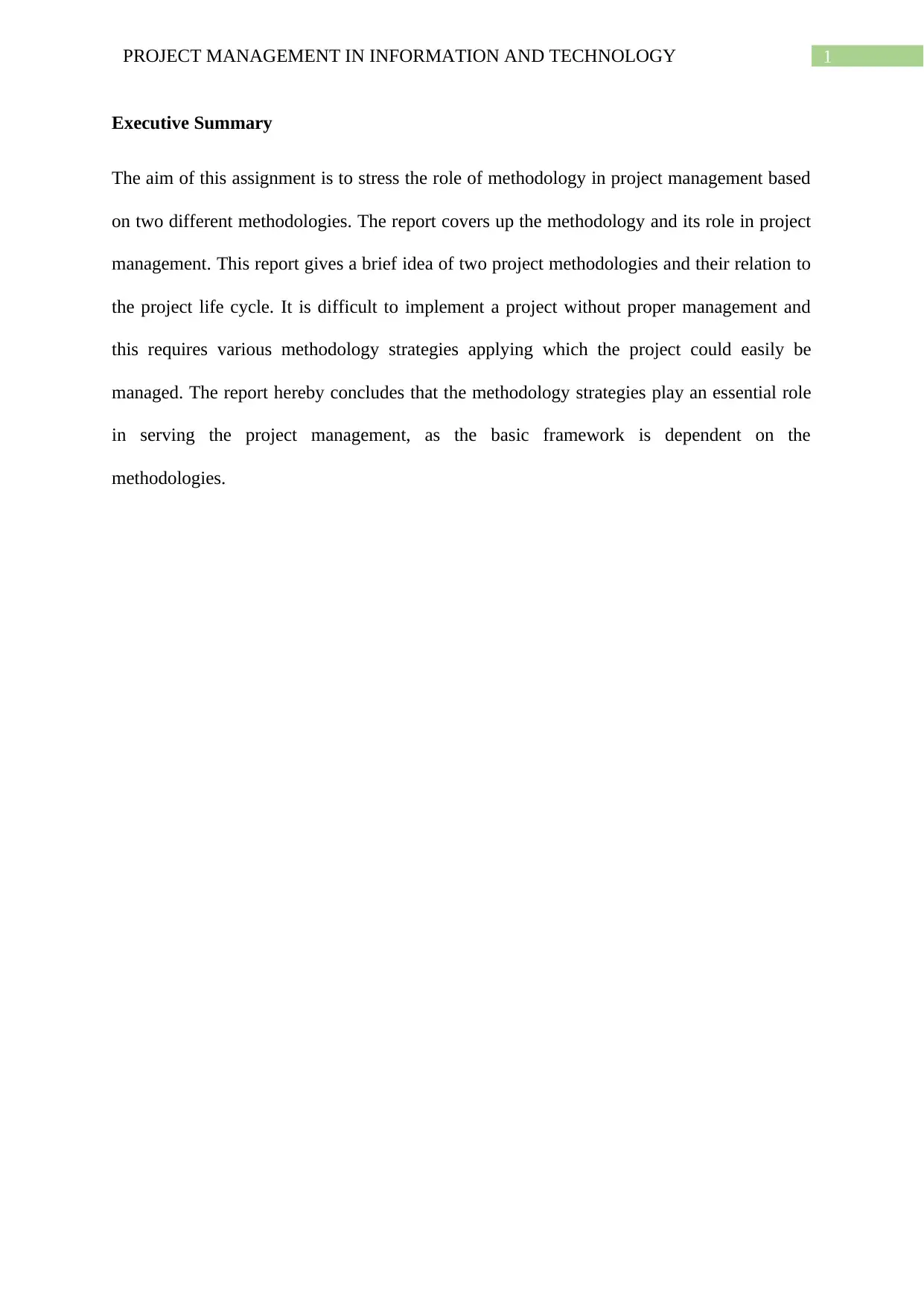
1PROJECT MANAGEMENT IN INFORMATION AND TECHNOLOGY
Executive Summary
The aim of this assignment is to stress the role of methodology in project management based
on two different methodologies. The report covers up the methodology and its role in project
management. This report gives a brief idea of two project methodologies and their relation to
the project life cycle. It is difficult to implement a project without proper management and
this requires various methodology strategies applying which the project could easily be
managed. The report hereby concludes that the methodology strategies play an essential role
in serving the project management, as the basic framework is dependent on the
methodologies.
Executive Summary
The aim of this assignment is to stress the role of methodology in project management based
on two different methodologies. The report covers up the methodology and its role in project
management. This report gives a brief idea of two project methodologies and their relation to
the project life cycle. It is difficult to implement a project without proper management and
this requires various methodology strategies applying which the project could easily be
managed. The report hereby concludes that the methodology strategies play an essential role
in serving the project management, as the basic framework is dependent on the
methodologies.
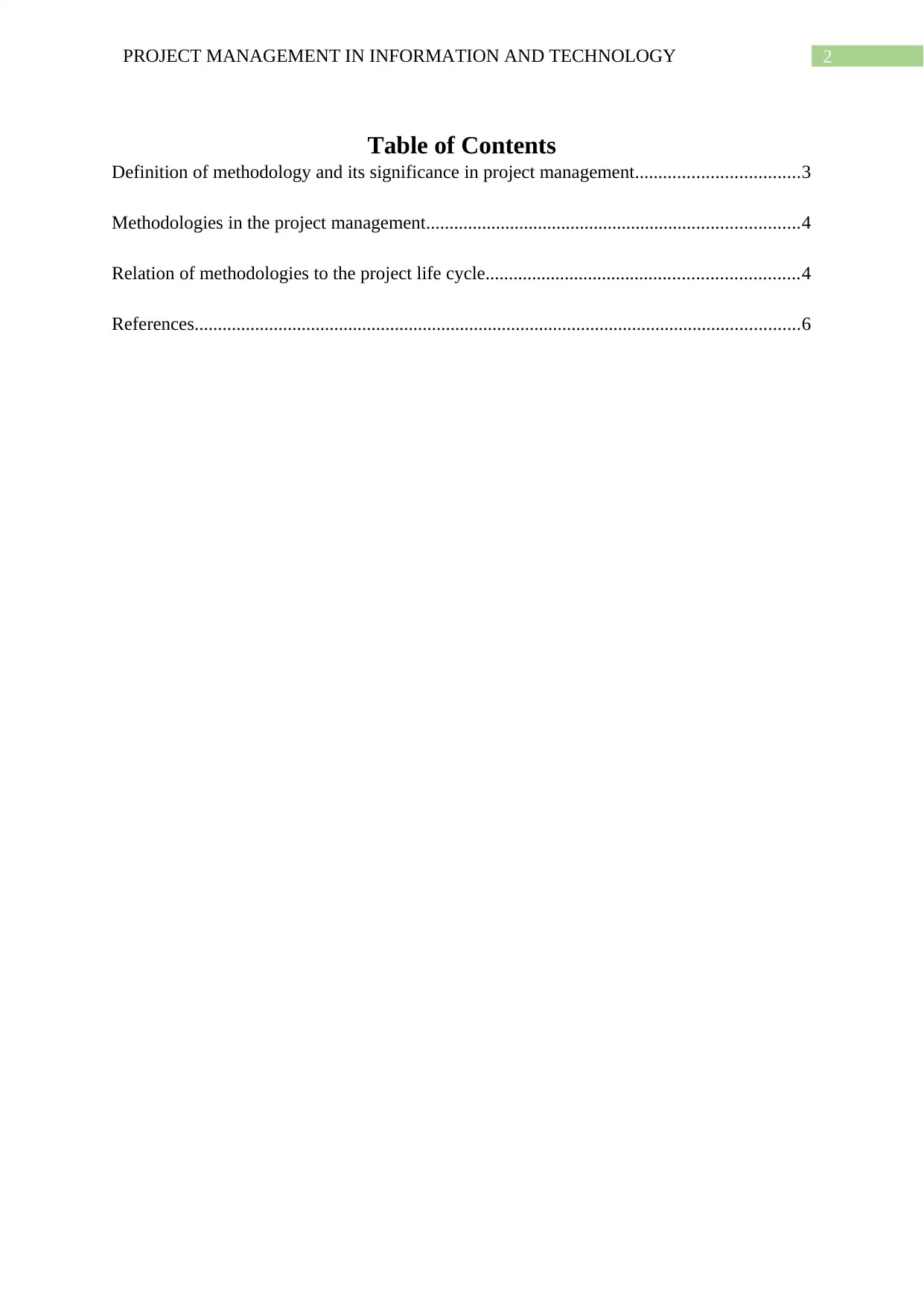
2PROJECT MANAGEMENT IN INFORMATION AND TECHNOLOGY
Table of Contents
Definition of methodology and its significance in project management...................................3
Methodologies in the project management................................................................................4
Relation of methodologies to the project life cycle...................................................................4
References..................................................................................................................................6
Table of Contents
Definition of methodology and its significance in project management...................................3
Methodologies in the project management................................................................................4
Relation of methodologies to the project life cycle...................................................................4
References..................................................................................................................................6
⊘ This is a preview!⊘
Do you want full access?
Subscribe today to unlock all pages.

Trusted by 1+ million students worldwide
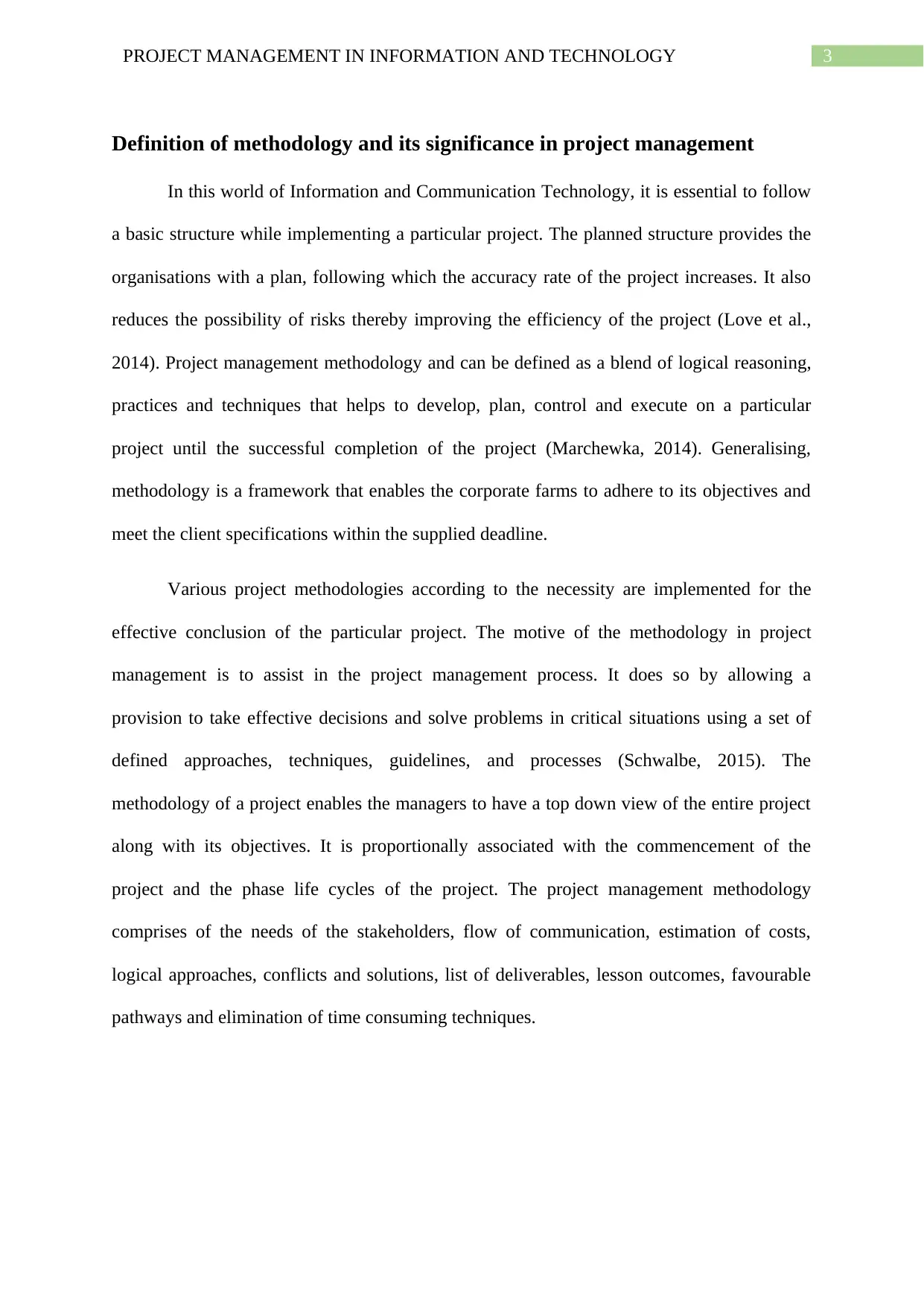
3PROJECT MANAGEMENT IN INFORMATION AND TECHNOLOGY
Definition of methodology and its significance in project management
In this world of Information and Communication Technology, it is essential to follow
a basic structure while implementing a particular project. The planned structure provides the
organisations with a plan, following which the accuracy rate of the project increases. It also
reduces the possibility of risks thereby improving the efficiency of the project (Love et al.,
2014). Project management methodology and can be defined as a blend of logical reasoning,
practices and techniques that helps to develop, plan, control and execute on a particular
project until the successful completion of the project (Marchewka, 2014). Generalising,
methodology is a framework that enables the corporate farms to adhere to its objectives and
meet the client specifications within the supplied deadline.
Various project methodologies according to the necessity are implemented for the
effective conclusion of the particular project. The motive of the methodology in project
management is to assist in the project management process. It does so by allowing a
provision to take effective decisions and solve problems in critical situations using a set of
defined approaches, techniques, guidelines, and processes (Schwalbe, 2015). The
methodology of a project enables the managers to have a top down view of the entire project
along with its objectives. It is proportionally associated with the commencement of the
project and the phase life cycles of the project. The project management methodology
comprises of the needs of the stakeholders, flow of communication, estimation of costs,
logical approaches, conflicts and solutions, list of deliverables, lesson outcomes, favourable
pathways and elimination of time consuming techniques.
Definition of methodology and its significance in project management
In this world of Information and Communication Technology, it is essential to follow
a basic structure while implementing a particular project. The planned structure provides the
organisations with a plan, following which the accuracy rate of the project increases. It also
reduces the possibility of risks thereby improving the efficiency of the project (Love et al.,
2014). Project management methodology and can be defined as a blend of logical reasoning,
practices and techniques that helps to develop, plan, control and execute on a particular
project until the successful completion of the project (Marchewka, 2014). Generalising,
methodology is a framework that enables the corporate farms to adhere to its objectives and
meet the client specifications within the supplied deadline.
Various project methodologies according to the necessity are implemented for the
effective conclusion of the particular project. The motive of the methodology in project
management is to assist in the project management process. It does so by allowing a
provision to take effective decisions and solve problems in critical situations using a set of
defined approaches, techniques, guidelines, and processes (Schwalbe, 2015). The
methodology of a project enables the managers to have a top down view of the entire project
along with its objectives. It is proportionally associated with the commencement of the
project and the phase life cycles of the project. The project management methodology
comprises of the needs of the stakeholders, flow of communication, estimation of costs,
logical approaches, conflicts and solutions, list of deliverables, lesson outcomes, favourable
pathways and elimination of time consuming techniques.
Paraphrase This Document
Need a fresh take? Get an instant paraphrase of this document with our AI Paraphraser
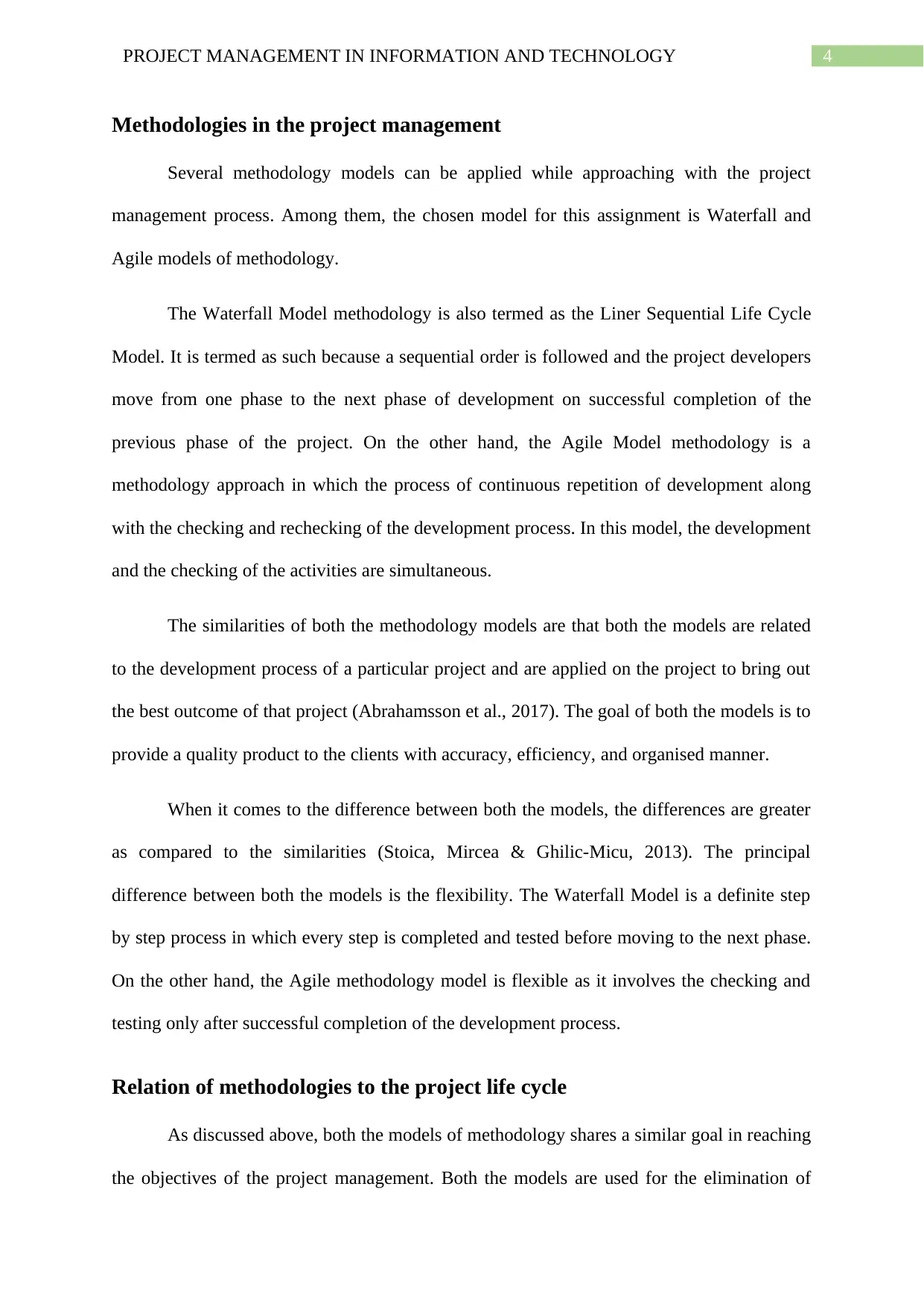
4PROJECT MANAGEMENT IN INFORMATION AND TECHNOLOGY
Methodologies in the project management
Several methodology models can be applied while approaching with the project
management process. Among them, the chosen model for this assignment is Waterfall and
Agile models of methodology.
The Waterfall Model methodology is also termed as the Liner Sequential Life Cycle
Model. It is termed as such because a sequential order is followed and the project developers
move from one phase to the next phase of development on successful completion of the
previous phase of the project. On the other hand, the Agile Model methodology is a
methodology approach in which the process of continuous repetition of development along
with the checking and rechecking of the development process. In this model, the development
and the checking of the activities are simultaneous.
The similarities of both the methodology models are that both the models are related
to the development process of a particular project and are applied on the project to bring out
the best outcome of that project (Abrahamsson et al., 2017). The goal of both the models is to
provide a quality product to the clients with accuracy, efficiency, and organised manner.
When it comes to the difference between both the models, the differences are greater
as compared to the similarities (Stoica, Mircea & Ghilic-Micu, 2013). The principal
difference between both the models is the flexibility. The Waterfall Model is a definite step
by step process in which every step is completed and tested before moving to the next phase.
On the other hand, the Agile methodology model is flexible as it involves the checking and
testing only after successful completion of the development process.
Relation of methodologies to the project life cycle
As discussed above, both the models of methodology shares a similar goal in reaching
the objectives of the project management. Both the models are used for the elimination of
Methodologies in the project management
Several methodology models can be applied while approaching with the project
management process. Among them, the chosen model for this assignment is Waterfall and
Agile models of methodology.
The Waterfall Model methodology is also termed as the Liner Sequential Life Cycle
Model. It is termed as such because a sequential order is followed and the project developers
move from one phase to the next phase of development on successful completion of the
previous phase of the project. On the other hand, the Agile Model methodology is a
methodology approach in which the process of continuous repetition of development along
with the checking and rechecking of the development process. In this model, the development
and the checking of the activities are simultaneous.
The similarities of both the methodology models are that both the models are related
to the development process of a particular project and are applied on the project to bring out
the best outcome of that project (Abrahamsson et al., 2017). The goal of both the models is to
provide a quality product to the clients with accuracy, efficiency, and organised manner.
When it comes to the difference between both the models, the differences are greater
as compared to the similarities (Stoica, Mircea & Ghilic-Micu, 2013). The principal
difference between both the models is the flexibility. The Waterfall Model is a definite step
by step process in which every step is completed and tested before moving to the next phase.
On the other hand, the Agile methodology model is flexible as it involves the checking and
testing only after successful completion of the development process.
Relation of methodologies to the project life cycle
As discussed above, both the models of methodology shares a similar goal in reaching
the objectives of the project management. Both the models are used for the elimination of
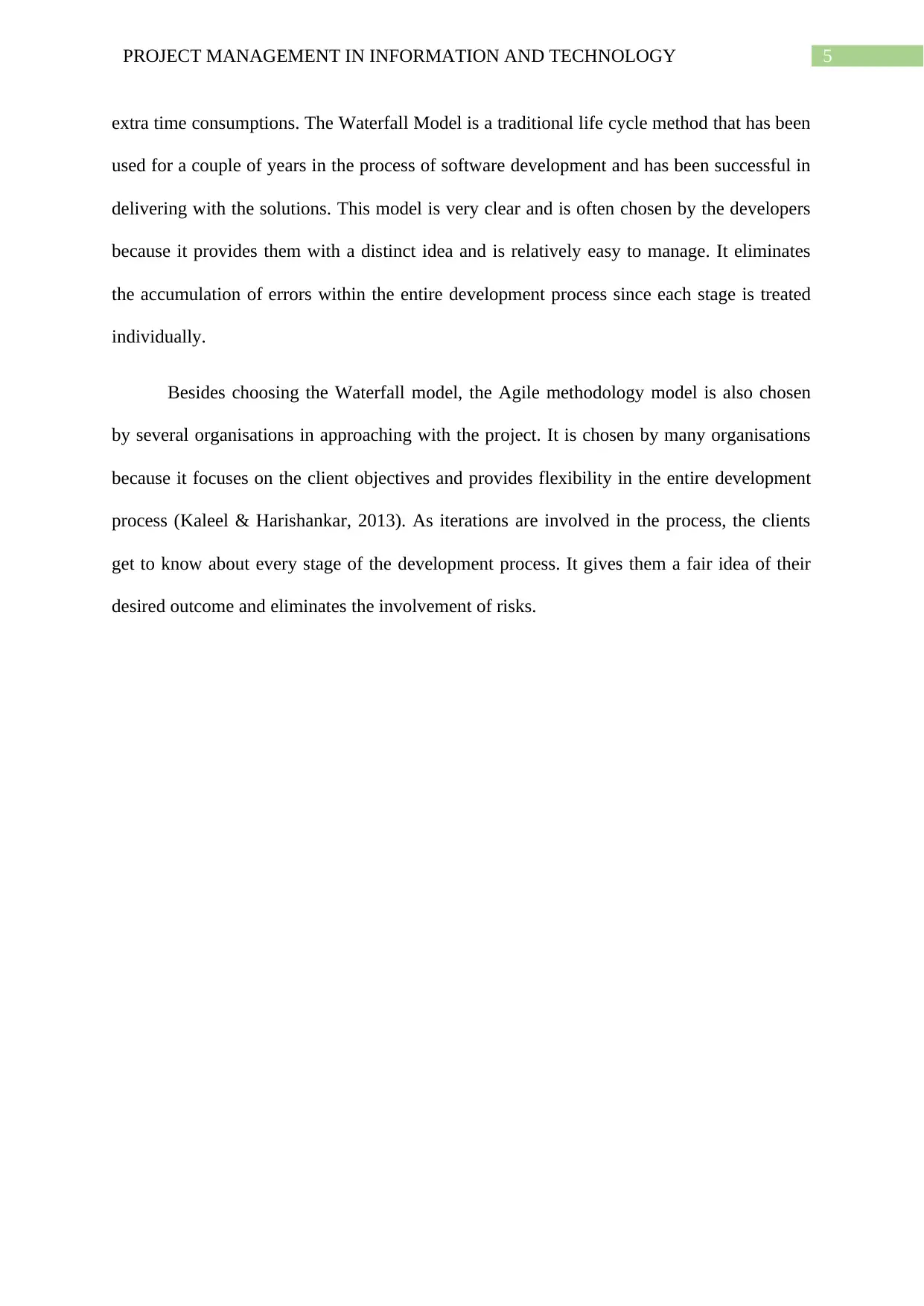
5PROJECT MANAGEMENT IN INFORMATION AND TECHNOLOGY
extra time consumptions. The Waterfall Model is a traditional life cycle method that has been
used for a couple of years in the process of software development and has been successful in
delivering with the solutions. This model is very clear and is often chosen by the developers
because it provides them with a distinct idea and is relatively easy to manage. It eliminates
the accumulation of errors within the entire development process since each stage is treated
individually.
Besides choosing the Waterfall model, the Agile methodology model is also chosen
by several organisations in approaching with the project. It is chosen by many organisations
because it focuses on the client objectives and provides flexibility in the entire development
process (Kaleel & Harishankar, 2013). As iterations are involved in the process, the clients
get to know about every stage of the development process. It gives them a fair idea of their
desired outcome and eliminates the involvement of risks.
extra time consumptions. The Waterfall Model is a traditional life cycle method that has been
used for a couple of years in the process of software development and has been successful in
delivering with the solutions. This model is very clear and is often chosen by the developers
because it provides them with a distinct idea and is relatively easy to manage. It eliminates
the accumulation of errors within the entire development process since each stage is treated
individually.
Besides choosing the Waterfall model, the Agile methodology model is also chosen
by several organisations in approaching with the project. It is chosen by many organisations
because it focuses on the client objectives and provides flexibility in the entire development
process (Kaleel & Harishankar, 2013). As iterations are involved in the process, the clients
get to know about every stage of the development process. It gives them a fair idea of their
desired outcome and eliminates the involvement of risks.
⊘ This is a preview!⊘
Do you want full access?
Subscribe today to unlock all pages.

Trusted by 1+ million students worldwide
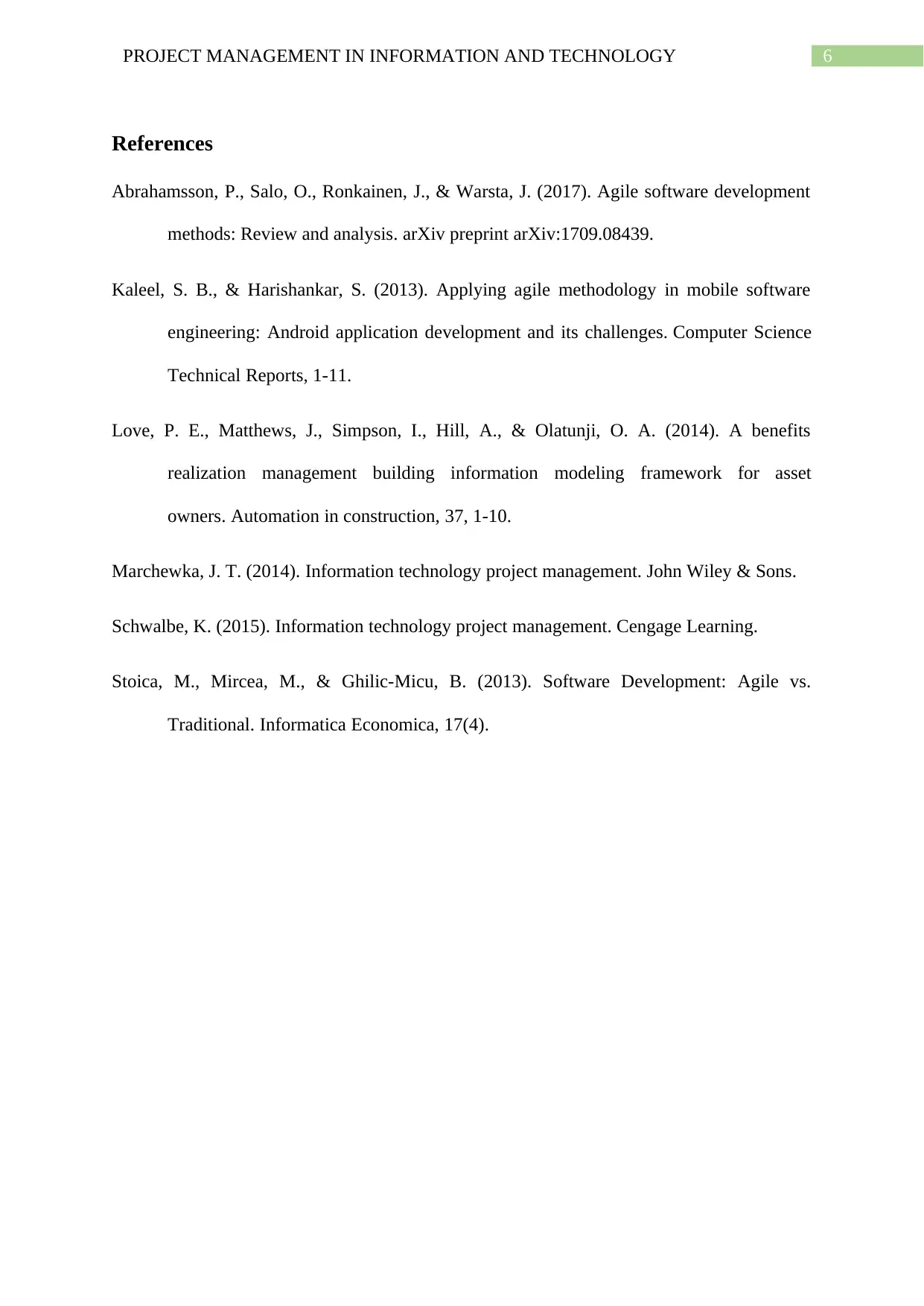
6PROJECT MANAGEMENT IN INFORMATION AND TECHNOLOGY
References
Abrahamsson, P., Salo, O., Ronkainen, J., & Warsta, J. (2017). Agile software development
methods: Review and analysis. arXiv preprint arXiv:1709.08439.
Kaleel, S. B., & Harishankar, S. (2013). Applying agile methodology in mobile software
engineering: Android application development and its challenges. Computer Science
Technical Reports, 1-11.
Love, P. E., Matthews, J., Simpson, I., Hill, A., & Olatunji, O. A. (2014). A benefits
realization management building information modeling framework for asset
owners. Automation in construction, 37, 1-10.
Marchewka, J. T. (2014). Information technology project management. John Wiley & Sons.
Schwalbe, K. (2015). Information technology project management. Cengage Learning.
Stoica, M., Mircea, M., & Ghilic-Micu, B. (2013). Software Development: Agile vs.
Traditional. Informatica Economica, 17(4).
References
Abrahamsson, P., Salo, O., Ronkainen, J., & Warsta, J. (2017). Agile software development
methods: Review and analysis. arXiv preprint arXiv:1709.08439.
Kaleel, S. B., & Harishankar, S. (2013). Applying agile methodology in mobile software
engineering: Android application development and its challenges. Computer Science
Technical Reports, 1-11.
Love, P. E., Matthews, J., Simpson, I., Hill, A., & Olatunji, O. A. (2014). A benefits
realization management building information modeling framework for asset
owners. Automation in construction, 37, 1-10.
Marchewka, J. T. (2014). Information technology project management. John Wiley & Sons.
Schwalbe, K. (2015). Information technology project management. Cengage Learning.
Stoica, M., Mircea, M., & Ghilic-Micu, B. (2013). Software Development: Agile vs.
Traditional. Informatica Economica, 17(4).
1 out of 7
Related Documents
Your All-in-One AI-Powered Toolkit for Academic Success.
+13062052269
info@desklib.com
Available 24*7 on WhatsApp / Email
![[object Object]](/_next/static/media/star-bottom.7253800d.svg)
Unlock your academic potential
Copyright © 2020–2026 A2Z Services. All Rights Reserved. Developed and managed by ZUCOL.





